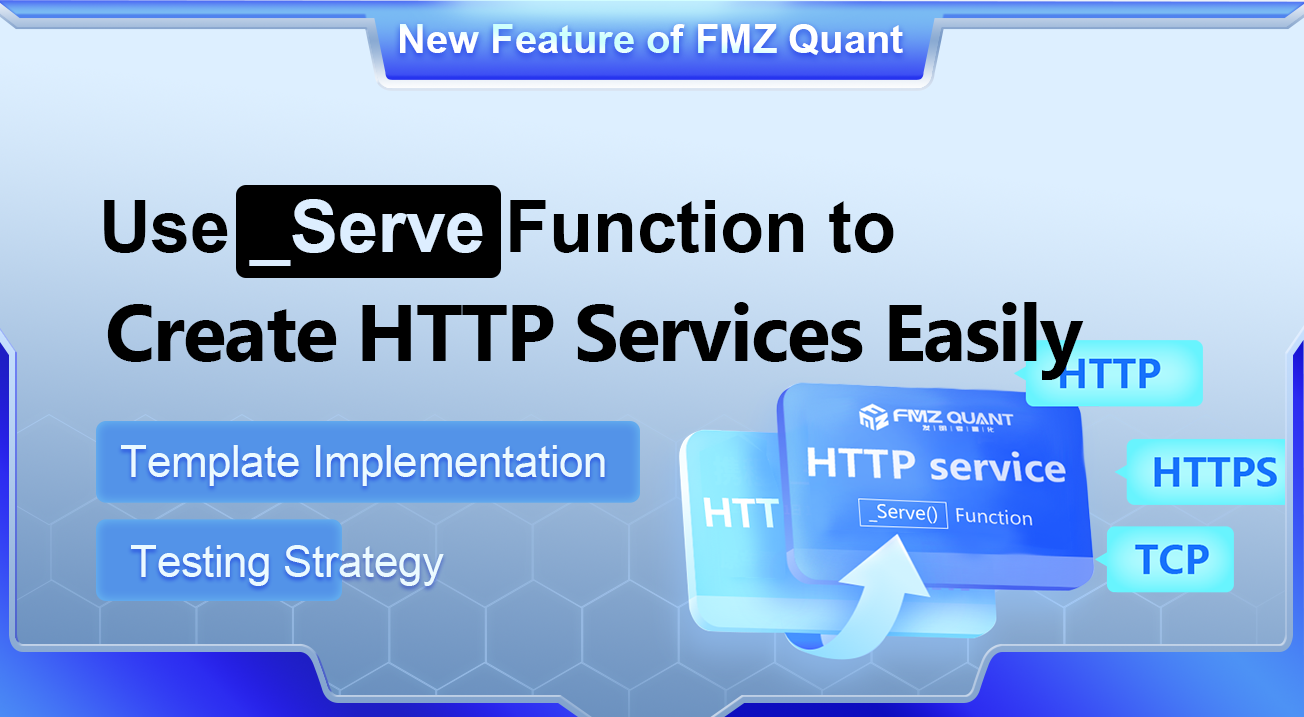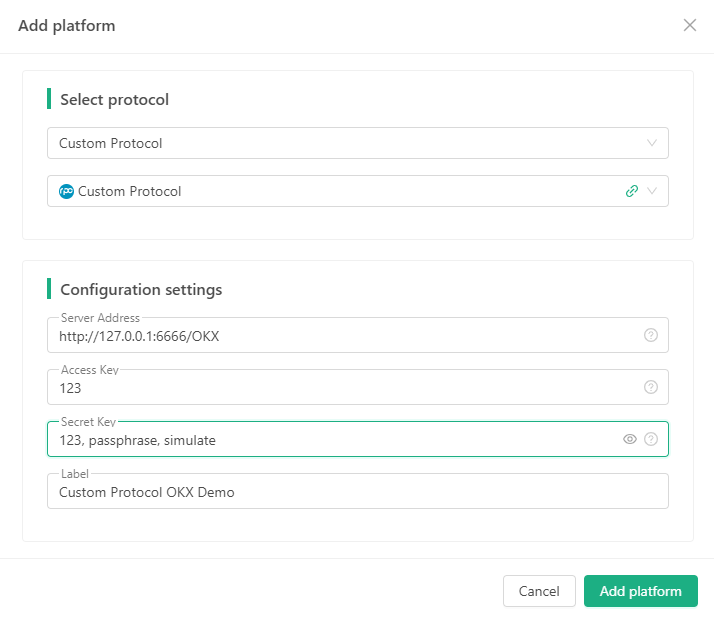Nueva característica de FMZ Quant: Utilice la función _Serve para crear servicios HTTP fácilmente
El autor:FMZ~Lydia, Creado: 2024-11-13 11:59:30, Actualizado: 2024-11-15 09:57:05
En el comercio cuantitativo y el desarrollo de estrategias automatizadas, a veces se utilizan servicios http._Serve()Con esta función, los desarrolladores pueden simplificar el proceso de configuración del servicio e implementar servicios más personalizados en el entorno cuantitativo, haciendo que el diseño de estrategias sea más suave y conveniente._Serve()para ayudarle a comenzar rápidamente con esta nueva función de FMZ Quant.
La documentación de la API de la plataforma para_Serve()se ha actualizado:
Demandas
La plataforma ha actualizado la función_Serve()(ya que el lenguaje JavaScript no tenía la función de crear servicios antes, esta función solo admite estrategias en el lenguaje JavaScript). En pocas palabras, permite que las estrategias tengan la capacidad de crear servicios de red. Basándose en esta función, podemos desarrollar muchas funciones y resolver muchos problemas. Por ejemplo, las estrategias pueden tener interfaces externas, reenvío de datos y cooperar con la función de protocolo personalizado de la plataforma para encapsular sin problemas los intercambios que no son compatibles con la plataforma FMZ.
En este artículo, utilizaremos la demanda de _Serve(), es más fácil para la estrategia del lenguaje JavaScript acceder al protocolo personalizado.
Encapsulamos el protocolo personalizado de la interfaz de intercambio para ser encapsulado como una
- La configuración de intercambio de protocolos personalizados en la plataforma es la siguiente:

Al diseñar una plantilla, podemos usar/OKXpara identificar a qué intercambio pertenece el objeto de intercambio de protocolos personalizados configurado.
Implementación de plantillas de protocolo personalizadas
En primer lugar, crear una nueva estrategia en la plataforma de negociación FMZ Quant, establecer el tipo de estrategia a la biblioteca de plantillas, y el lenguaje de estrategia a JavaScript.
Diseño de parámetros de plantilla
Añadir 3 parámetros a la plantilla de estrategia creada:

Luego podemos empezar a diseñar y escribir código para la plantilla de protocolo personalizado.
Implementación del código
El código está escrito en estilo TS.$.startService()Función es una función de interfaz de plantilla utilizada para iniciar el servicio de protocolo personalizado.
// @ts-check
$.startService = function (address, port, proxyConfig) {
__Serve(`http://${address}:${port}`, function (ctx, proxyConfig) {
// interface
interface IData {
data: object
raw: object
}
interface IError {
error: any
}
// custom protocol for OKX
class CustomProtocolOKX {
apiBase: string = "https://www.okx.com"
accessKey: string
secretKey: string
passphrase: string
proxyConfig: string = ""
simulate: boolean = false
constructor(accessKey: string, secretKey: string, passphrase: string, simulate?: boolean, proxyConfig?: string) {
this.accessKey = accessKey
this.secretKey = secretKey
this.passphrase = passphrase
if (typeof(simulate) == "boolean") {
this.simulate = simulate
}
this.proxyConfig = proxyConfig
}
httpReq(method: string, path: string, query: string = "", params: {[key: string]: any} = {}, headers: {key: string, value: string | ArrayBuffer}[] = []): {[key: string]: any} {
let ret = null
let options = {
method: method,
headers: {
'User-Agent': 'Mozilla/5.0 (Windows; U; Windows NT 6.1; en-US; rv:1.9.1.6) Gecko/20091201 Firefox/3.5.6',
'Content-Type': 'application/json; charset=UTF-8',
'x-simulated-trading': this.simulate ? "1" : "0"
},
}
// headers
if (Array.isArray(headers) && headers.length > 0) {
for (var pair of headers) {
options.headers[pair.key] = pair.value
}
}
let url = ""
if (method == "GET") {
if (typeof(query) == "string" && query.length > 0) {
url = `${this.apiBase}${path}?${query}`
} else {
url = `${this.apiBase}${path}`
}
} else {
url = `${this.apiBase}${path}`
options.body = JSON.stringify(params)
}
// request
try {
if (this.proxyConfig != "") {
url = `${this.proxyConfig}${url}`
}
ret = JSON.parse(HttpQuery(url, options))
} catch(e) {
return null
}
return ret
}
callSignedAPI(method: string, path: string, query: string = "", params: {[key: string]: any} = {}): {[key: string]: any} {
const strTime = new Date().toISOString().slice(0, -5) + 'Z'
let jsonStr = ""
if (method == "GET") {
jsonStr = Object.keys(params).length > 0 ? JSON.stringify(params) : ""
} else {
jsonStr = Object.keys(params).length > 0 ? JSON.stringify(params) : "{}"
}
let message = `${strTime}${method}${path}${jsonStr}`
if (method === "GET" && query !== "") {
message = `${strTime}${method}${path}?${query}${jsonStr}`
}
const signature = Encode("sha256", "string", "base64", message, "string", this.secretKey)
let headers = []
headers.push({key: "OK-ACCESS-KEY", value: this.accessKey})
headers.push({key: "OK-ACCESS-PASSPHRASE", value: this.passphrase})
headers.push({key: "OK-ACCESS-TIMESTAMP", value: strTime})
headers.push({key: "OK-ACCESS-SIGN", value: signature})
return this.httpReq(method, path, query, params, headers)
}
urlEncode(params: {[key: string]: string | number}): string {
let encodeParams: string[] = []
for (const [key, value] of Object.entries(params)) {
encodeParams.push(`${encodeURIComponent(key)}=${encodeURIComponent(value)}`)
}
return encodeParams.join("&")
}
symbol2Inst(symbol: string): string {
let arr = symbol.split("_")
if (arr.length >= 2) {
return `${arr[0]}-${arr[1]}`.toUpperCase()
} else {
return `${arr[0]}-USDT`.toUpperCase()
}
}
getSymbol(inst: string): string {
let arr = inst.split("-")
if (arr.length >= 2) {
return `${arr[0]}_${arr[1]}`.toUpperCase()
} else {
return `${arr[0]}-USDT`.toUpperCase()
}
}
// The following code encapsulates OKX's interface
GetTicker(symbol: string): IData | IError {
// GET /api/v5/market/ticker , param: instId
let inst = this.symbol2Inst(symbol)
let ret = this.httpReq("GET", "/api/v5/market/ticker", `instId=${inst}`)
let retData = {}
for (var ele of ret["data"]) {
retData["symbol"] = this.getSymbol(ele["instId"])
retData["buy"] = ele["bidPx"]
retData["sell"] = ele["askPx"]
retData["high"] = ele["high24h"]
retData["low"] = ele["low24h"]
retData["open"] = ele["open24h"]
retData["last"] = ele["last"]
retData["vol"] = ele["vol24h"]
retData["time"] = ele["ts"]
}
return {data: retData, raw: ret}
}
GetAccount(): IData | IError {
// GET /api/v5/account/balance
let ret = this.callSignedAPI("GET", "/api/v5/account/balance")
let retData = []
for (var ele of ret["data"]) {
for (var detail of ele["details"]) {
let asset = {"currency": detail["ccy"], "free": detail["availEq"], "frozen": detail["ordFrozen"]}
if (detail["availEq"] == "") {
asset["free"] = detail["availBal"]
}
retData.push(asset)
}
}
return {data: retData, raw: ret}
}
IO(method: string, path: string, params: {[key: string]: any}): {[key: string]: any} {
let ret = null
if (method == "GET") {
ret = this.callSignedAPI(method, path, this.urlEncode(params))
} else {
ret = this.callSignedAPI(method, path, "", params)
}
return {data: ret}
}
}
// protocol factory
class ProtocolFactory {
static createExWrapper(accessKey: string, secretKey: string, exName: string): any {
let protocol = null
if (exName == "/OKX") {
try {
let passphrase = ""
let simulate = false
let arrSecretKey = secretKey.split(",")
if (arrSecretKey.length == 2) {
secretKey = arrSecretKey[0]
passphrase = arrSecretKey[1]
} else if (arrSecretKey.length == 3) {
secretKey = arrSecretKey[0]
passphrase = arrSecretKey[1]
simulate = arrSecretKey[2] == "simulate" ? true : false
} else {
return null
}
protocol = new CustomProtocolOKX(accessKey, secretKey, passphrase, simulate, proxyConfig)
} catch(e) {
Log("e.name:", e.name, "e.stack:", e.stack, "e.message:", e.message)
return null
}
}
return protocol
}
}
// http service
let resp = {}
let reqMethod = ctx.method()
let reqPath = ctx.path()
let httpMethod = ctx.header("Http-Method")
let reqBody = null
try {
reqBody = JSON.parse(ctx.body())
} catch(e) {
resp = {error: {name: e.name, stack: e.stack, message: e.message, errDesc: "JSON parse error."}}
}
// onPost
if (reqMethod == "POST") {
if (!["access_key", "secret_key", "method", "params"].every(key=> key in reqBody)) {
resp = {error: {reqBody: reqBody, errDesc: "reqBody error."}}
}
if ("error" in resp) {
ctx.write(JSON.stringify(resp))
return
}
let accessKey = reqBody["access_key"]
let secretKey = reqBody["secret_key"]
let method = reqBody["method"]
let params = reqBody["params"]
let protocol = ProtocolFactory.createExWrapper(accessKey, secretKey, reqPath)
if (!protocol) {
ctx.write(JSON.stringify({error: {errDesc: "createExWrapper error."}}))
return
}
// process GetTicker / GetAccount ...
if (method == "ticker") {
if (!["symbol"].every(key=> key in params)) {
resp = {error: {params: params, errDesc: "params error."}}
} else {
let symbol = params["symbol"]
resp = protocol.GetTicker(symbol)
}
} else if (method == "accounts") {
resp = protocol.GetAccount()
} else if (method.slice(0, 6) == "__api_") {
resp = protocol.IO(httpMethod, method.slice(6), params)
} else {
ctx.write(JSON.stringify({error: {method: method, errDesc: "method not support."}}))
return
}
ctx.write(JSON.stringify(resp))
}
}, proxyConfig)
}
function init() {
$.startService(address, port, proxyConfig)
Log("Start the custom protocol service, address:", address, ",port:", port, "#FF0000")
if (proxyConfig != "") {
Log("Setting up the proxy:", proxyConfig, "#FF0000")
}
}
Debido al espacio limitado, no todas las interfaces se implementan aquí.consultas de mercado , búsqueda de activos, yLlamada de IOLos usuarios que estén interesados pueden implementar todas las interfaces. Después de que el diseño esté completo, guarde el código de la plantilla y guarde el nombre de la plantilla como:
Estrategia de pruebas
Después de configurar el OKX exchange
Estrategia comprueba nuestra biblioteca de plantillas diseñada:

Código de la estrategia de ensayo:
function main() {
// Test GetTicker
Log(`exchange.GetTicker():`, exchange.GetTicker())
// Test GetAccount
Log(`exchange.GetAccount():`, exchange.GetAccount())
// Test exchange.IO
Log(`exchange.IO("api", "POST", "/api/v5/trade/cancel-all-after", "timeOut=0"):`, exchange.IO("api", "POST", "/api/v5/trade/cancel-all-after", "timeOut=0"))
// Output the exchange name added by the custom protocol
Log(`exchange.GetName():`, exchange.GetName())
// Output exchange tags added by the custom protocol
Log(`exchange.GetLabel():`, exchange.GetLabel())
}
Pruebas de ejecución

Como podemos ver, la estrategia solo necesita verificar una plantilla para lograr un acceso sin problemas al intercambio OKX (aunque el intercambio OKX ya lo admite, por ejemplo, OKX se reemplaza aquí por un intercambio al que FMZ aún no se ha conectado).
- Introducción al arbitraje de lead-lag en criptomonedas (2)
- Introducción al conjunto de Lead-Lag en las monedas digitales (2)
- Discusión sobre la recepción de señales externas de la plataforma FMZ: una solución completa para recibir señales con servicio HTTP incorporado en la estrategia
- Exploración de la recepción de señales externas de la plataforma FMZ: estrategias para una solución completa de recepción de señales de servicios HTTP integrados
- Introducción al arbitraje de lead-lag en criptomonedas (1)
- Introducción al conjunto de Lead-Lag en las monedas digitales (1)
- Discusión sobre la recepción de señales externas de la plataforma FMZ: API extendida VS estrategia Servicio HTTP incorporado
- Exploración de la recepción de señales externas de la plataforma FMZ: API de expansión vs estrategia de servicio HTTP incorporado
- Discusión sobre el método de prueba de estrategias basado en el generador de tickers aleatorios
- Explorar métodos de prueba de estrategias basados en generadores de mercado aleatorios
- Nuevas capacidades cuantificadas por los inventores: fácil creación de servicios HTTP con _Serve
- Guía de acceso al protocolo personalizado de la plataforma de negociación cuántica FMZ
- Estrategia de adquisición y seguimiento de la tasa de financiación de la FMZ
- Estrategias de captación y monitoreo de las tasas de fondos de FMZ
- Una plantilla de estrategia le permite utilizar WebSocket Market sin problemas
- Una plantilla de políticas que te permite usar el sector WebSocket sin problemas
- Guía de acceso a las plataformas de intercambio cuantitativo de los inventores
- Cómo construir una estrategia de negociación universal de varias monedas rápidamente después de la actualización de FMZ
- ¿Cómo construir una estrategia de negociación multicurrency general después de la actualización de FMZ?
- Comercio de DCA: una estrategia cuantitativa ampliamente utilizada